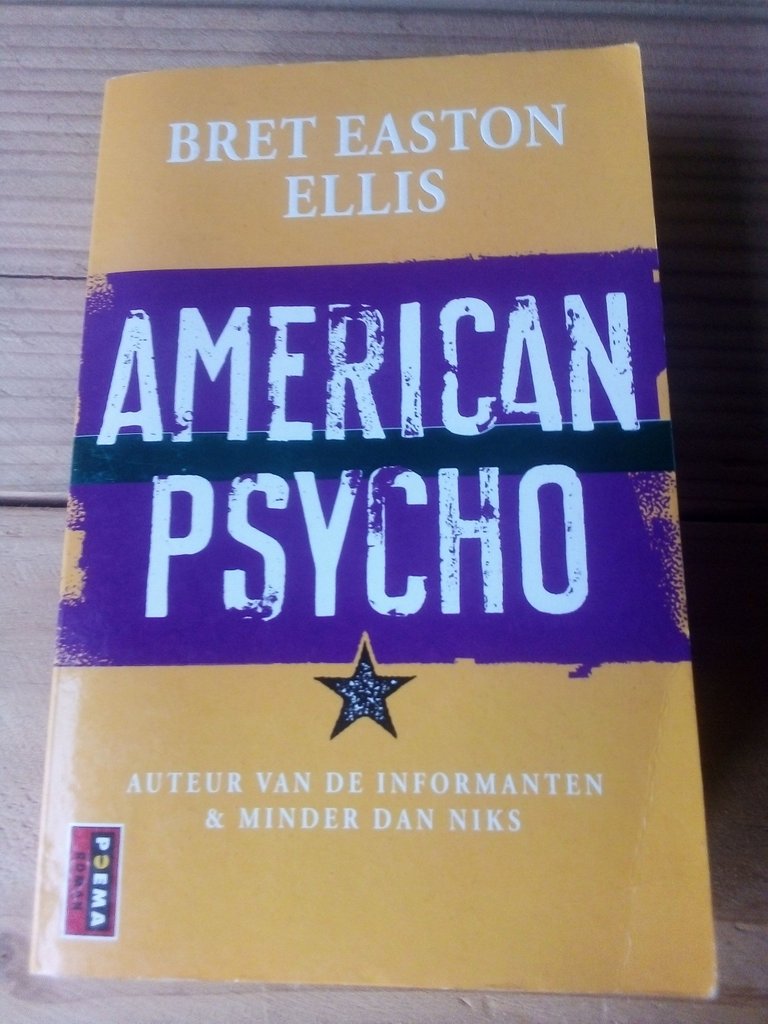
Hello Hivers and Book Clubbers,
Back again with another review, and back to the realm of fiction. I found this book at my local second-hand bookstore for 2 euros, so I had to take it with me. The book in question is 'American Psycho', written by Bret Easton Ellis. It's most likely better known as the same-titled movie, with Christian Bale in the leading role. Apart from some very well-known clips, I've never seen the movie. The book was published in 1991, and so is my 1991 Dutch copy. It totals to about 500 pages, so it's not the shortest novel, though it doesn't feel long-winded either. From this point on; SPOILER ALERT.
Living the Dream, or Not?
Patrick Bateman, the main character, seems to have a lot of things going for him. He is very wealthy; no numbers are mentioned, but he's quite likely a millionaire. His apartment-suite is in the same building as that of Tom Cruise; he only wears top-brand clothing, is always buying the newest technological gadgets, etc. He works at Wall Street in a prestigious firm, and it is implied in the story that he wouldn't really need to work considering his wealth.
He has quite a lot of friends, mostly colleagues, and he does quite well with women. Yet Bateman seems unfulfilled by all this. Something's missing, it seems. That's one of the main motifs of the book that Ellis seems to bring forward: wealth in itself isn't everything. It doesn't seem to fulfill Bateman at all. He surely tries; new suits, a new TV-set, ridiculously expensive fitness-memberships, etc.
But the flip-side is shown too; his relationship with family members is abysmal. He is jealous of his brother, whose career is taking off faster than his own. He acts horribly towards his own mother. And his relationship with his girlfriend is a rollercoaster of ups and downs that doesn't seem healthy at all.
The Downward Spiral
So Bateman looks for thrills and fulfillment elsewhere. The book is written from his point of view, so you can read his thoughts. From the beginning onwards, he thinks negative thoughts of others. That's not unnatural at all, most of us do so. Later on, he starts fantasizing about killing others. And I don't mean in a simple 'I wish he'd be gone' kind of way, but also how he would do it. In detail.
And then the actual killing starts, and he gets a thrill out of it. There does not seem to be a pattern, and if there is, I have not found it through this first reading. Sometimes he kills complete strangers who annoy him in some way. At other times he kills who he feels have done him wrong somehow; an ex-girlfriend who he crossed paths with after several years, for example.
These murders are described in gruesome detail; this book is not for the weak of stomach in that regard. He gets a thrill out of torturing his victims, which can take several pages of the book. This thrill is also sexual in part; his most common type of victim is quite likely prostitutes.
I say 'likely' because it is not clear what the total tally of his killing-spree is. The story has some skips and jumps, as long as two or three months, and it is heavily implied that he did not stop his 'routine' during those periods.
An unfair world
The total is also not known because, somehow, Bateman is not caught or dead by the end of it. His life continues in a remarkably similar ways as it started at the beginning of the book. There were close calls; there was a police chase, with the use of search helicopters, but he got away. At one point he confesses his crimes to a friend, who simply doesn't believe him.
It seems unfair. It is. Ellis weaves this as a theme throughout the book. He often descibes homeless people begging on the side of the road. Often Bateman walks past them without caring. Bateman, in the story, deserves worse than he does. He should be in jail, for life most likely. And since this is the United States in the 1980s, he'd likely get the death penalty. The beggars deserve better. But nothing changes during the book, and it's open ending does not even carry the promise of improvement.
Conclusion
It's not weird that this is a book that shocked its audience in the early 1990s; it's gory, vulgar, and any good moral of the story is completely lacking. But it was also very popular (perhaps because of those things); the copy I have is the 8th printing in a single year. The movie is probably even more popular. I might have to watch that sometime, even though I'm not much of a movie-watcher.
I'll be back with more reviews in the future, either fictional or non-fictional. I recently counted 49 books on my shelf that I haven't read yet. And yet I keep buying more. It's a bit of an addiction, I guess. I'll see you all in the next one,
-Pieter Nijmeijer
(Top image; self-made photo of book cover)